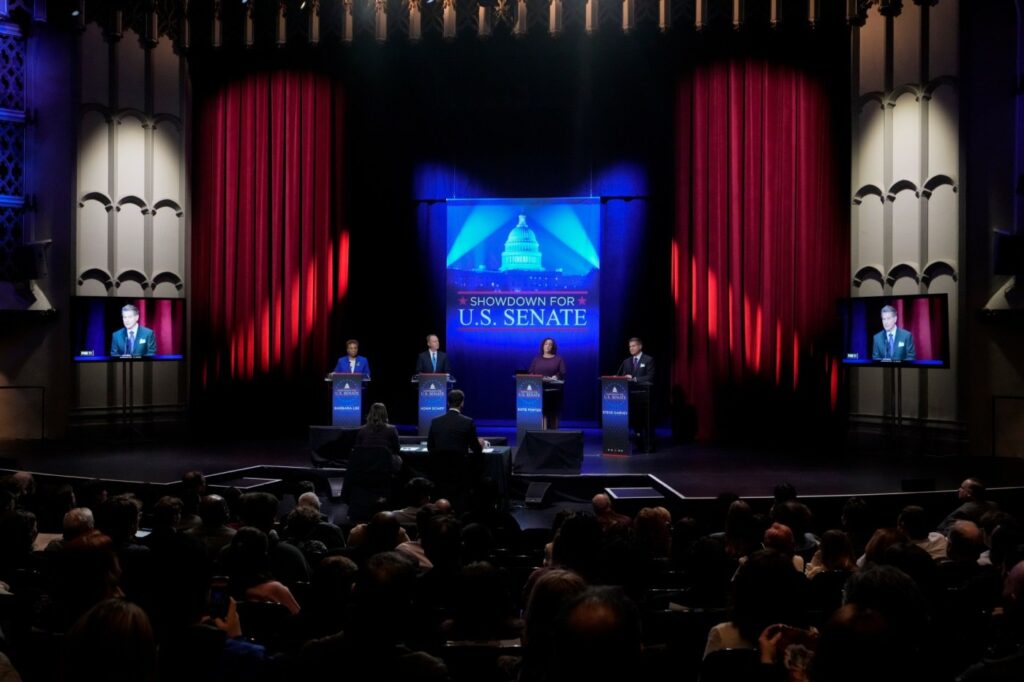
Health care, war in the Middle East and former President Donald Trump divided the four top candidates for California’s U.S. Senate race Monday night as they sparred in their first debate of the cycle.
Democratic Reps. Adam Schiff, Barbara Lee and Katie Porter, as well as Republican businessman and former Dodgers star Steve Garvey, took a debate stage at USC where they traded jabs — and baseball references — for an hour and a half.
It was health care, specifically a question on Medicare for All, that caused the most fireworks among the four.
Porter, who has represented an Orange County district since 2019, expressed her support for what’s been dubbed a “Medicare for All” system.
“I think we need to pass a health care system that delivers the best quality care with the most choice at the lowest price point,” Porter said, arguing that’s Medicare for All.
Schiff expressed support for an opt-in Medicare for All System, calling it an “efficient … direction we need to go in.”
Health care, Lee said, “should be a human right” and touted her record of supporting single-payer health care initiatives.
Garvey, for his part, said Medicare for All would “be a strain on our economy.” When asked about the Affordable Care Act, Garvey says he believes it works for some.
It was during this time that Porter launched what became an oft-repeated from the debate stage criticism at her Democratic House colleagues: “Career politicians,” she said, hadn’t moved the needle on a better health care system.
“Others can talk about taking on corporations or taking on industries. Some of us have actually done things, gotten things accomplished,” Schiff shot back.
Trump, the Republican presidential frontrunner, was also the catalyst of some of the more tense moments of the debate Monday.
While Garvey has sought to distance himself from Trump throughout the campaign thus far, that simply wasn’t an option as his three Democratic opponents aligned him with the former president’s agenda — and called him out for not unequivocally saying whether he’d back Trump in 2024.
Garvey said he did support Trump twice before but as for his vote this year, his answer was: “At the end of the day, it’s a personal choice. It’s my personal choice, and I will make it in the sovereignty of wherever that is.”
“Once a Dodger always a dodger,” said Porter, referencing his 14 seasons with the MLB team.
After the debate, Porter and Schiff resumed their criticism of Garvey for refusing to say if he would vote for Trump a third time. Garvey, however, climbed into a car and ignored reporters’ shouted questions as he left the venue.
Ahead of Monday’s debate, it was Schiff, a Burbank Democrat who maintains a substantial lead over the rest of the field, according to a recent Emerson College poll that found his support rising. Garvey, coming in second, has also seen a boost in support, whereas Porter and Lee have remained stagnant.
And while they were the most progressive candidates on the stage, Lee and Porter used the debate to highlight their differences.
During opening remarks, Porter reiterated her opposition to earmarks, where individual members of Congress can bypass the federal government’s regular spending process and request money for a local project. Earmarks, she said, “invite corruption.”
But Lee has an opposite position: “I believe in earmarks. I believe in not being derelict in my duty,” she said, saying she supports funneling federal money for nonprofits and organizations that address homelessness, LGBTQ+ people and climate initiatives.
“It would be a derelict of duty to my constituents to not fight for every single dollar that I could find,” said Lee, who represents an Oakland district. “No, it won’t solve all the problems, but it sure has filled in the gaps.”
“We’re a donor state. We send far more back in tax dollars to Washington than we get back,” said Schiff. “Any senator from California who says, ‘no, we’re not going to fight for those resources,’ that’s going to be wonderful news” for the other states.
Another difference among the Democrats: the Israel-Hamas war.
Lee has called for an immediate ceasefire and permanent ceasefire in Gaza — where Israel has launched a bruising offensive since the Oct. 7 terrorist attack and kidnapping of civilian hostages by Hamas.
But Schiff says Israel should be able to defend itself. He wants the U.S. to work toward a two-state solution, he said, but doesn’t want Hamas, which has been dubbed a terrorist organization, to control Gaza.
“No country after being attacked by terrorists could refuse to defend itself,” Schiff said.
“If you don’t have a permanent ceasefire now, more people are going to get killed,” said Lee.
A demonstration calling for an immediate ceasefire met the crowd as it exited the debate.
4 Senate candidates will debate tonight. Here’s what they need to accomplish
Related Articles
Sacramento Snapshot: Legislative effort launched to kick Trump off California ballot
4 Senate candidates will debate tonight. Here’s what they need to accomplish
Biden to promote internet access in North Carolina, a state he hopes to win in 2024
In the race for Rep. Michelle Steel’s seat, how abortion is shaping up to be a key issue
New Hampshire gets its turn after Trump’s big win in Iowa puts new pressure on Haley and DeSantis
The televised event was the first time voters were able to really compare, side-by-side, not just these top candidates, but also the three Democratic House members in the race for the seat long held by Sen. Dianne Feinstein, who died Sept. 29.
But for those who missed Monday’s live event, another debate is already in the works. KTLA will host the same four candidates on Monday, Feb. 12 at 7 p.m. for another contest.
